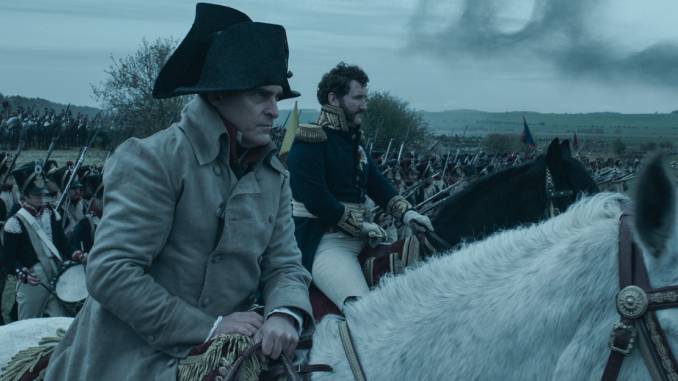Thoroughly Entertaining Napoleon Is a Little Short on the Man Himself

Ridley Scott’s Napoleon begins in 1793, as the future military commander, world conqueror and cuckold witnesses the execution of Marie Antoinette with muted, meditative poise. The peasants and townspeople surrounding him froth at the mouth in exuberant fury. He’s clearly taking the scene in as a means to plan his next moves, a cascade of tactics and strategies which form a path through the life of the legendary Short King (Emperor, sorry), whose name now bears the title of an entire psychological complex found in insecure, diminutive men. Scott takes us through 22 years of Napoleon’s life over the course of two-and-a-half hours (although, he’d like us to see all four hours of his intended film), throwing up titles with names and dates to assist us in understanding the sequence of events. Of course, Napoleon is less about Napoleon’s exploits than it is about the man and the myth—the temperament which made him infamous in pop culture, partly dictated by his absurd relationships with women, no more important than his former wife, Josephine.
And yet the film doesn’t spend nearly enough time rooting around in Napoleon’s mind, leaving Joaquin Phoenix—in a role which acts as a surprising companion piece to his other 2023 film about a guy with mommy issues, Beau Is Afraid—with little to do, aside from do what he does best: Occasionally erupt in rage, occasionally be funny, but mostly brood around like a little gray storm cloud. Whereas Scott’s second-most recent French period piece, The Last Duel, was a compellingly structured drama about the conflicting ways in which men and women see the same world, Napoleon falters. It is less a rich, twisty drama than a journey through a historical figure’s greatest hits, punctuated by more engrossing moments of vulnerability and intimacy that only leave you wishing there were more.
-

-

-

-

-

-

-

-

-

-

-

-

-

-

-

-

-

-

-

-

-

-

-

-

-

-

-

-

-

-

-

-

-

-

-

-

-

-

-

-








































